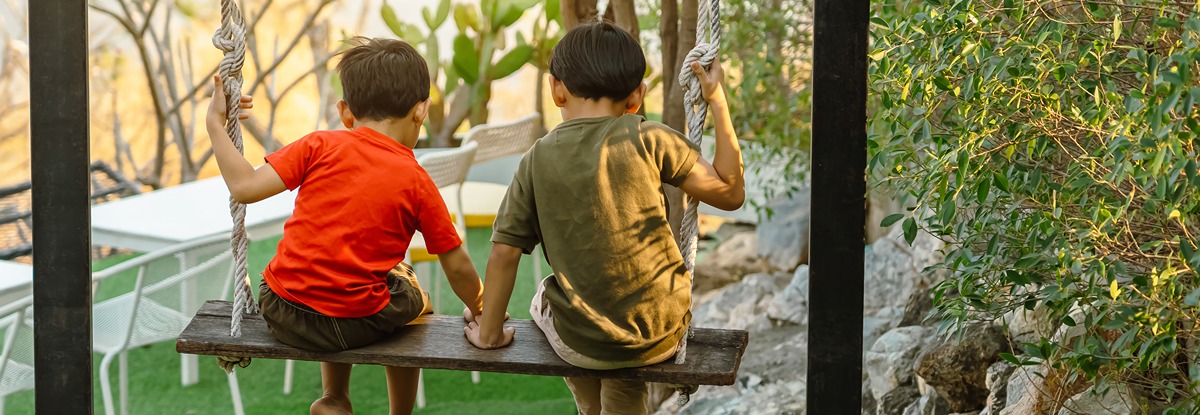When parents separate or divorce in Arizona, one of the hardest decisions for families is how child custody should be arranged, especially when more than one child is involved. In some cases, courts may consider a split custody arrangement where siblings live with different parents. While this is not typical, there are situations where the court may decide that split custody serves the best interest of the child or children involved.
Parents facing this decision often feel torn between what they want and what the court may ultimately decide. Arizona child custody laws focus heavily on the best interest of the child, which means the court may split siblings only when there is clear evidence that it is the healthiest option for the child. Understanding how an Arizona court evaluates split custody can help parents protect their parenting rights in custody battles.
Here’s what this article will cover:
- What Does Split Custody Mean in Arizona?
- How Arizona Law Views Keeping Siblings Together
- When Might an Arizona Court Approve Split Custody?
- Real-World Examples of Split Custody in Arizona
- How Parenting Plans and Decision-Making Affect Sibling Custody
- What Role Does the Child’s Preference Play?
- Child Support When Siblings Are Split Between Parents
- FAQs About Split Custody of Siblings in Arizona
- How the Law Offices of Daniel Hutto Can Help With Custody Cases
This explains how Arizona family courts handle split custody arrangements, the factors judges consider under Arizona Revised Statutes, and how a well-crafted parenting plan can help parents avoid unwanted surprises. You will also learn why working with an experienced Arizona child custody lawyer, like the team at the Law Offices of Daniel Hutto, can make a difference when custody decisions are on the line.
How an Arizona Family Law Attorney Can Help
Our Phoenix Family Law Attorneys are Here to Help!

What Does Split Custody Mean in Arizona?
Split custody means that siblings do not live primarily in the same household. For example, one child may live with one parent while the other child lives with the other parent. This is different from joint custody or joint legal custody, where both parents share decision-making and parenting time for all the children together.
Arizona’s child custody laws do not favor split custody by default. Under A.R.S. § 25-403, the court considers various factors when determining custody or visitation rights. Courts must look at the best interests of the child in each family situation. The law requires judges to consider factors such as the emotional ties between the child and each parent, the child’s relationship with siblings, and whether keeping siblings together supports their overall well-being.
How Arizona Law Views Keeping Siblings Together
Family courts in Arizona generally believe that keeping siblings together is in the best interest of the child, as it helps address concerns related to custody and visitation. Arizona law recognizes the significance of sibling bonds and the emotional support that brothers and sisters offer to each other during a divorce or custody dispute.
A.R.S. § 25-403(A)(2) specifically says courts should look at the “interaction and interrelationship of the child with the child’s parent or parents, the child’s siblings, and any other person who may significantly affect the child’s best interest.”
This means that, all else equal, judges usually prefer a custody arrangement that keeps siblings together.
However, there are cases when separating siblings may protect them from harm or serve their interests better. For example, if one child has special needs that one parent can better handle, or if there is evidence of abuse involving one child and not the other, a split custody decision could be justified.
When Might an Arizona Court Approve Split Custody?
Arizona courts do not order split custody lightly. Judges want clear reasons showing that the benefits of separating siblings outweigh the strong interest in keeping them together. A split custody order usually comes up in one of three situations:
- Conflict Between Siblings: If siblings have a toxic or dangerous relationship, the court may consider splitting them for the sake of safety and emotional stability.
- Special Needs or Best Fit in child custody in Arizona can significantly impact decisions regarding custody arrangements. When one parent is substantially better suited to care for a child with unique medical or educational needs, the court may award sole custody.
- Child Preference: If an older child is mature enough to express a strong, reasonable preference to live apart from a sibling.
A good example is when one parent lives closer to a special school or therapy center that a child needs, while the other parent provides a stable routine for the other child in a different district.
The Law Offices of Daniel Hutto has worked with families facing these sensitive questions. An experienced Arizona child custody attorney can help present the facts to demonstrate why a split might benefit or harm the child’s well-being.
Real-World Examples of Split Custody in Arizona
Let’s look at two examples of how an Arizona court may handle a split custody arrangement.
Example 1: Different Needs
A divorced couple has two children. The older child has significant learning disabilities and attends a special program in Scottsdale. The mother lives near the specialized school and has flexible work hours to manage the child’s appointments. The younger sibling is thriving in a different school and wants to stay in the neighborhood near the father’s home in Mesa. After hearing from a custody evaluator, the court may decide that it is in the best interest of each child to live where they receive the best support, even if that means living apart.
Example 2: Safety Concerns
Two teenage brothers fight violently when living together. School counselors, therapists, and the family court all agree that separating them would reduce conflict and allow each boy to have a safe and healthy relationship with each parent, particularly in custody battles. In this case, the Arizona family law judge could issue a split custody order to ensure the brothers’ safety and provide the necessary stability.
These situations are rare, but they show that Arizona courts always aim to protect the interests of the child.
How Parenting Plans and Decision-Making Affect Sibling Custody
When parents are going through a divorce in Arizona, they must submit a parenting plan to the court. A parenting plan outlines the arrangements for making legal decisions and allocating parenting time, including physical custody and visitation schedules.
If parents wish to request split custody, their parenting plan must clearly outline how each child’s needs will be met, particularly in cases of sole custody. The Arizona Revised Statutes require parenting plans to address both legal custody (decision-making authority) and physical custody (where the child resides).
For example, one parent may have sole legal custody of a child with special needs to manage schooling and medical care, while both parents share joint legal custody of another child. Parenting time must be structured to allow siblings to maintain contact, such as spending weekends together or taking summer visits, unless that contact is deemed harmful.
What Role Does the Child’s Preference Play?
Some parents wonder whether a child can choose which parent to live with. Arizona law does not specify a particular age at which a child can choose. Instead, A.R.S. § 25-403 gives judges the authority to consider a child’s wishes if the child is of suitable age and maturity.
When siblings disagree about where they want to live, the court may appoint a custody evaluator or guardian ad litem to hear their views and help resolve custody issues. Older teenagers’ preferences often carry more weight, especially if the reasons are mature and reasonable. For example, an older sibling may want to finish high school with friends, while the younger sibling may be too young to make such a decision.
Child Support When Siblings Are Split Between Parents
When siblings live apart under a split custody arrangement, child support can become more complex. The Arizona Department of Economic Security utilizes the state’s Child Support Guidelines to calculate child support payments. These guidelines take into account the child’s residence and the amount of parenting time each parent is entitled to.
A parent with sole physical custody of one child may receive child support payments from the other parent, or both parents may be required to provide support for the child in their care during periods of custody. The court may issue a child support order that ensures the fair meeting of both children’s needs.
The Law Offices of Daniel Hutto often works with families to ensure that any child support orders align with the reality of split custody and parenting time.
FAQs About Split Custody of Siblings in Arizona
⑴ Is split custody common in Arizona?
No. Split custody is not the standard in Arizona child custody cases. Courts in the state of Arizona typically keep siblings together unless there is a compelling reason to separate them for the child’s best interest.
⑵ In the state of Arizona, understanding the nuances of child custody can significantly impact parents’ approaches to custody issues. Can parents agree to split custody on their own?
Parents can suggest a split custody agreement, but the court must still review and approve it to ensure it serves the child’s best interest.
⑶ Does a child get to choose which parent to live with?
Children can share their preferences if they are mature enough, but the final custody decision always rests with the court.
⑷ If unmarried parents wish to request split custody, their parenting plan must clearly outline how each child’s needs will be met under Arizona law. How does split custody affect parenting time?
A split custody arrangement requires a detailed parenting plan. Parents should outline how the children will interact with each other and how decision-making will be handled.
⑸ Do I need a lawyer for a split custody case?
Because split custody is complicated, it is wise to consult an experienced Arizona child custody lawyer to protect your rights and your child’s interests.
⑹ Will child support be higher with split custody?
Not always. Child support is determined by parenting time, income, and which parent covers specific expenses for each child.
⑺ Can siblings be split in cases of child abuse?
Yes. If there is evidence that split custody protects one or more children from abuse or neglect, the court may order it.
How the Law Offices of Daniel Hutto Can Help With Custody Cases

Handling a split custody arrangement is one of the more sensitive areas of family law. Parents must show the Arizona court clear reasons for any custody decision that separates siblings. At the Law Offices of Daniel Hutto, our experienced Arizona family law attorneys help parents present the best possible case to protect their children’s interests.
Daniel Hutto has built his reputation on guiding Arizona families through complicated child custody cases with care and skill. Whether you are seeking a split custody order, defending your parenting time rights, or need help with child support, our team will stand by your side at every step.
We are familiar with Arizona child custody laws and understand how family courts approach sibling relationships, parenting plans, and decision-making authority. We can help you prepare clear evidence, build a strong parenting plan, and negotiate a fair custody agreement.
If you are facing a split custody decision or any other custody dispute in Arizona, call the Law Offices of Daniel Hutto today at 602-536-7878 to schedule your free consultation with an experienced Arizona child custody attorney.











